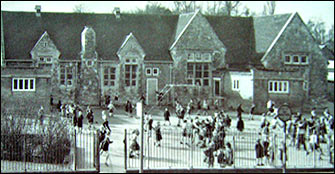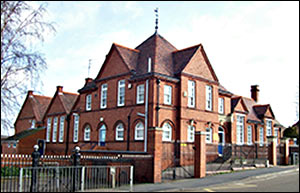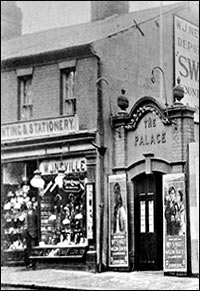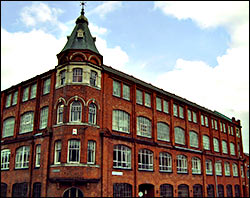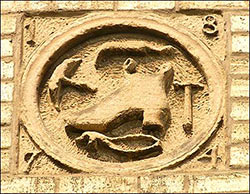|
||||||||||||||||||||
| Part of an interview with Mr & Mrs Prickett by Rae Drage, December 2007. Transcribed by Jacky Lawrence |
||||||||||||||||||||
|
Mr & Mrs Prickett - Memories |
||||||||||||||||||||
|
|
||||||||||||||||||||
| Mrs Prickett. 'When I started school in 1924, I was four. I remember being in the infants school and there were two Miss Baileys, one Miss Bailey, was very tall so we called her big Miss Bailey. There other one was short and plump, so we called her little Miss Bailey.
Mr Prickett. 'The headmistress was Mrs Scott or Miss Scott I can't remember.' Mrs Prickett. 'Well I don't remember Miss Scott.' Mr Prickett. 'In the infants this is.'
Mrs. Prickett. 'I had 12/6, I used to give me mum 10/- and had the 2/6 myself. Yes, that bought a lot then.'
Mrs. Prickett. 'I remember Billy Graham coming to the Ritz and I bet I were only about sixteen then. I should say it were about, it could be when we were about fifteen. I think that would be about 1935ish, roughly. Billy Graham, yes, oh, yes I went to see him. Yes, it were a big thing then. Yes, I remember going to see him.' Mr. Prickett. 'Well, when I left school you see I joined St. Mary's Institute and that used to be a small hall in the back of the Athletic Club in Robinson Road just where the bend is where you go along from Newton Road, then turn right. Up Barkers Close was St Mary's Church playing fields and in the middle of them playing fields was three trees and the old rector there, the Reverend Stoney, he wouldn't let them cut the trees down so we could have a football pitch with no trees in. And we played football and cricket in that field all through my youth. 'Course, just before the war broke out we had a new Rector and he came along and he said we could have them down and we took them down ourselves. We had to dig all they way round the roots and go right down and then we pulled them down ourselves. There was a large membership of the old St. Mary's Institute some of them were quite old compared with us and we were young teenagers. You see I always remember that and in that field also we had to put up with the cow flop. There was cows kept in there by a Mr Barney Smith as lived almost at the top of Robinson Road. Most nights we were down in there. You could play table tennis and football and snooker, billiards and skittles. We had a lovely skittle board the old fashioned nine pin board which has died out now apparently, yes, that was our main entertainment though, St Mary's Institute. There was also an Adults school in Rushden and there was a lot of members of that and also the YMCA. When they closed the Institute just before the war we all went down to the YMCA. There was a little bit of controversy about the Reverend Green as came just before the war and he didn't believe in this and he didn't believe in that. We used to hold dances there at one time, in the old Institute, and he didn't approve of dancing, he said it was immoral and he stopped that and there were one or two concerts we used to hold to help the funds to keep it going and he didn't approve of those so finally it was closed, he closed it. Well of course, when they closed the Institute all the members left and went elsewhere. There was no sports field at the YMCA no, and yet the Adult school . . . but that finished most of the sport after that. We all split up and got called up when the war started, we were away five or six years. I went back to Greens for a little while until I was forty wasn't I? Yes, and then I went to the Council as caretaker of the Council Offices at Rushden and the public library and I were there until I was sixty, when I had a heart attack and had to take early retirement. When I were retired at sixty they said you haven't got long to go, make the most of it and I'm eighty six now.'
And then I left there, I think I'd be about I was nineteen, twenty when David was born. You see I was married by then you see, then course David's dad was killed in the war. Yes, so of course I didn't work for a long time but then when Jean started down the High school and David at the Technical Grammar, I got a job down Leedons. I always remember when I went it was a Mr Shorley who was there and he asked me a lot of questions and he said. 'Where have you worked previously?' I says, 'Grensons.' I didn't get any farther, he said. 'That's good enough for me,' and I got the job. I worked there until our grandson was born and I thought, no I must enjoy him, I'll leave off work 'cos Bob didn't want me to go to work and I've never worked since.
Mr. Prickett. 'And I remember as a boy coming down here, I were only about six or seven, there was a row of all stone cottages down the bottom of here where these other houses are below us and there was an old man there as done hand sewing. He done it all by hand, the soles to the uppers and his name was Buck Turner. He used to be the old, I dunno whether he was official or unofficial, town crier and I do remember Buck once or twice when I were very young ringing his bell. He'd got no uniform or nothing, ringing his bell and shouting out if there was what they call a pot cart, that was a stall at the back of one of the pubs. Sometimes it were the Wheatsheaf and sold all crockery. And if there were a jumble sale or anything like that he used to go round ringing his bell, I just remember him ringing his bell and shouting out this and that but I can't tell you what he said. And afterwards he always used to say. 'Don't say old Buck hasn't told you.' That was a familiar saying, yes. Mrs. Prickett. 'When I left school I went to the Park Road Chapel, we used to go when we went to Sunday School. It was along the Assembly Rooms, back of the old chapel, you know where the old rectory is, what they call the Rock Foundation. We used to go to when I was little and the old chapel was there and across the way a bit there was what they called the Assembly Rooms. It was later changed into a factory. They had pews in the centre and all round the edge they had like little, well, it were little place where there was, seats went round sort of, so you separated, each had their own little individual classroom like, partitions, that's it and we went there. Then, I used to be in the Girl's Brigade and we used to put a lot of pantomimes on. We did Cinderella one year. And we did go up to the Albert Hall one year to do country dancing. Yes, and there was quite a lot of us that was with the Girls' Brigade and well, it was Girls' Life Brigade then and we used to have what they called tea drinking. I don't know why it was called tea drinking but it was always in June, I presume it was June and we always wore nice dresses. We used to parade through Rushden High Street and then as you got to the Wills corner you each went off to your individual churches. Like St. Mary's, they went to the Institute. The High Street Chapel went into the Methodist and somebody used to go into South End School which was down the bottom here then. I don't know what it celebrated. It would be on a Saturday and they used to have sports in the different fields, you had various sports and races and country dancing. It was a Sunday School treat you see and I mean we would be about seven or eight or nine possibly. It happened every year, it had been doing so for years and carried on until the war. There was a band to lead each church, each different Sunday School. I always remember, when when we used to go and I think of it, whenever I hear it now, it always played 'Blaze Away'. And there was a Mr Walter Webb, he lived in Cromwell Road, where the fish shop was. He lived near there and he had a daughter Grace and he always used to lead it and I can see us now walking, there was no houses built then you see, walking down Allen Road, fields you see and we used to march up these fields. We had, tea I suppose, if it were wet you went to the Assembly Rooms. You see we used to have drink and it was always a beautiful, what we called 'blow cake', and that was plain cake, it was a luxury then. Every year, I don't know what it celebrated, it just that it happened every year, each church each organisation.' Mr. Prickett. 'Got together, you see it was organised by all religious bodies. We went in the Institute field, where Barkers Close is now, where the three trees were and we had sports and one thing and another and they had one or two stalls selling fruit and one thing and another. When I was young too, on a Monday evening, we went to the Salvation Army at the bottom of Queen Street. Oh, yes, and they used to give a magic lantern show or have a speaker or something like that. You had to pay 1d and when you come out you always had little something. Sometimes it was just a little paper bag with a few chips in, another week when you come away they give you one with a few sweets in and oh, one week it were, or one or two weeks, we come back with 'Cayli', do you remember the old 'Cayli?' And that were Mondays. On Tuesdays I used to go along to the Baptists along here. This Assembly Rooms what we called The Band of Hope, that were another 1d, that was a big thing there where they had entertainment. I should say I was about eleven or twelve up to about fourteen.' Mrs. Prickett. 'Well, yes, and there was a Mr & Mrs Robinson they lived up, well they finished up in Hall Avenue. He used to play the fiddle and she played the piano and they always used to play for us. That was at The Band of Hope. They always played every week and of course you had a little religious service as well to finish, both meetings were semi religious. We used to have films and all that sort of thing and it was quite, there was a lot there, you know very, very popular and then we had what they called Christian Endeavour. That was another youth organisation there but I didn't go to that a lot because I think by the time I was old enough it more or less disbanded.' |
||||||||||||||||||||
|
|
||||||||||||||||||||
|
|
